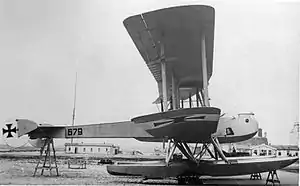Gotha WD.11
The Gotha WD.11 (for Wasser Doppeldecker - "Water Biplane") was a torpedo bomber seaplane developed in Germany during World War I. When the general configuration of the Gotha WD.7 proved promising, Gotha set to work designing a much larger and more powerful aircraft along the same general lines. Like its predecessor, it was a conventional biplane with twin engines mounted tractor-fashion on the lower wing. The pilot and observer sat in tandem, open cockpits and the landing gear consisted of twin pontoons. 12 examples were built for the Imperial German Navy.
| WD.11 | |
|---|---|
 | |
| Role | Torpedo bomber |
| National origin | Germany |
| Manufacturer | Gotha |
| First flight | 1916 |
| Primary user | Imperial German Navy |
| Number built | 13 |
Specifications (WD.11)
Data from German Aircraft of the First World War[1]
General characteristics
- Crew: 2
- Length: 13.43 m (44 ft 1 in)
- Wingspan: 22.51 m (73 ft 10 in)
- Height: 4.75 m (15 ft 7 in)
- Wing area: 103.4 m2 (1,113 sq ft)
- Empty weight: 2,437 kg (5,373 lb)
- Gross weight: 3,583 kg (7,899 lb)
- Powerplant: 2 × Mercedes D.III 6-cylinder water-cooled in-line piston engines in pusher nacelles, 120 kW (160 hp) each
- Propellers: 2-bladed wooden fixed-pitch pusher propellers
Performance
- Maximum speed: 120 km/h (75 mph, 65 kn)
- Rate of climb: 1.3 m/s (260 ft/min)
- Time to altitude: 1,000 m (3,300 ft) in 12 minutes
Armament
- Guns: 1 x 7.92 mm (0.312 in) Parabellum MG 14
- Bombs: 1 x 725 kg (1,598 lb) Torpedo
References
| Wikimedia Commons has media related to Gotha WD.11. |
- Gray, Peter; Thetford, Owen (1970). German Aircraft of the First World War (2nd ed.). London: Putnam. p. 403. ISBN 0-370-00103-6.
Further reading
- Taylor, Michael J. H. (1989). Jane's Encyclopedia of Aviation. London: Studio Editions. p. 428.
- World Aircraft Information Files. London: Bright Star Publishing. pp. File 895 Sheet 09.
This article is issued from Wikipedia. The text is licensed under Creative Commons - Attribution - Sharealike. Additional terms may apply for the media files.